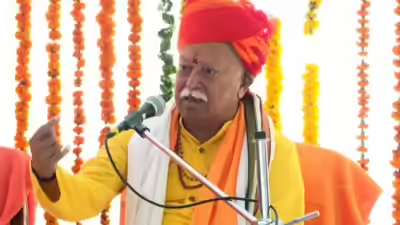
A Shocking Allegation from Within the System
In a stunning revelation that has reignited debates around the Malegaon blast case, retired ATS officer Mehiboob Mujawar has claimed he was instructed to arrest RSS chief Mohan Bhagwat as part of a fabricated narrative of “saffron terror.” The statement, made in early August 2025, has created political tremors and drawn intense scrutiny of the original investigation.
The Claim: ‘Arrest the RSS Chief—No Questions Asked’
According to Mujawar, the order came during the early stages of the 2008 Malegaon blast probe, when a high-profile campaign was underway to link the incident to Hindutva-affiliated groups. He was told to arrest Bhagwat, Ramji Kalsangra, Sandip Dange, and Dilip Patidar despite no concrete evidence.
He alleges the instruction came from then ATS senior officers, possibly under political pressure. Mujawar refused to comply, calling the directive “horrific” and legally baseless.
Repercussions: Punished for Not Complying
After his refusal, Mujawar claims he was slapped with false criminal cases, which ruined his nearly 40-year career in law enforcement. “I was told to show dead people as alive in the chargesheet,” he stated, adding that he has documentary evidence to prove his claims.
Backdrop: The Malegaon Case and Its Fallout
The 2008 Malegaon blast killed six people and injured over 100. The original investigation led to the arrest of figures like Pragya Singh Thakur and Lt. Col. Prasad Purohit, fuelling a political narrative around so-called “saffron terror.”
However, in 2025, an NIA special court acquitted all seven accused, citing a complete lack of credible evidence. The verdict not only raised doubts about the integrity of the ATS investigation but now appears to validate Mujawar’s claims.
Political and Legal Ramifications
Mujawar’s testimony has led to:
- Calls for a re-investigation of ATS methods during the UPA era.
- Demands for action against senior officers and possible political actors involved.
- Questions about media complicity in shaping public opinion based on unverified charges.
The revelations have also sparked fresh accusations of institutional misuse of anti-terror laws for ideological ends.
A Probe That May Rewrite the Narrative
Mujawar’s bombshell may mark a turning point in the debate over how terror investigations are used—or misused—in India. If substantiated, his claims could expose a dangerous precedent where law enforcement was weaponized for political propaganda. As the public and judiciary demand answers, the Malegaon blast case may once again dominate national discourse—not for what happened in 2008, but for what was made to happen after.
FOR MORE BLOGS –beyondthepunchlines.com

 Add to favorites
Add to favorites







